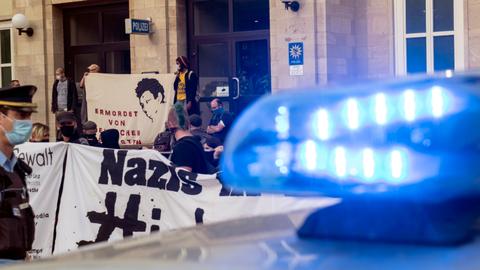With the first signs of an economic recession in Germany come clear signs of the rise of the country’s far right – and this time even Ukrainian refugees are concerned.
A video recently surfaced on social media showing two police officers in Berlin brutally arresting a Syrian refugee at his home in front of his two young children for failing to pay a €750 fine. When the man’s wife protested the aggressive nature of the arrest, a police officer turned to her and said, “This is my country, you are a guest here.”
Shortly after the video went viral, the far-right Alternative for Germany (AfD) jumped in with a nearly full-page newspaper ad titled “We stand by you” in support of the renegade police officer.
This marked a turning point for Germany: in the weeks that followed, the country saw a significant increase in far-right protests in major cities, closely followed by violence and a suspected arson attack on the home of some Ukrainian refugees.
Massive protests by the far-right neo-Nazi AfD have been particularly widespread in Berlin, where protesters have denounced both the country’s energy shortages and cost-of-living inflation. “If the Germans aren’t satisfied, why are there outsiders?” is her new appeal.
Of even greater concern, however, Germany’s leading polling institute recently reported a steep rise in the AfD’s popularity in political opinion polls across the country.
Falling orders
Analysts agree that the bigger catalyst for the shift in sentiment among German voters is the country’s gradual economic decline, the end of which is not yet in sight.
“Yes, it’s disturbing; you see it a lot [that] Such parties are usually successful in times of crisis. We saw it in the Syrian refugee crisis, in the Corona pandemic crisis, and it’s happening again now as we go through an economic and energy crisis,” says political scientist Professor Hajo Funke.
The German economy is facing a recession, its GDP is on a downward trend in 2023 and its exports are being severely impacted by declining orders from international buyers. The country’s current account surplus shrank sharply to 0.6 billion euros (nearly $600 million) in August 2022 from 17 billion euros (nearly $17 billion) in the same month last year.
The ongoing energy crisis means heating bills have more than doubled for many across the country and thousands of businesses are being forced to close.
One of Germany’s largest bakery chains, Thilmann Brot GmbH, has gone bankrupt and the country’s largest toilet paper maker, Hakle, has closed due to rising energy prices.
As Germany prepares for the impending recession, there are fears that cuts in public spending affecting social services will give far-right movements a further boost.
Funke says: “With the Ukraine war we now have 1.2 million refugees in Germany, who are confronted with problems similar to those of Syrian refugees, especially in the east of the country.”
The problem in the east
In eastern Germany there are states that were formerly part of East Germany, now part of the former USSR, where pro-Russian sentiment still thrives. Since the beginning of the war in Ukraine, the opposition’s initial murmurs about sanctions against Russia have turned into a shrill protest.
Many of these states have been economically disadvantaged since German reunification, with fewer job opportunities and higher crime and drug abuse rates.
In the state of Saxony, in the relatively affluent city of Leipzig, a demonstration against inflation and the energy crisis took an ugly turn when protesters bumped into Ukrainian refugees and began shouting slogans against Russian sanctions and that Ukrainian refugees were not welcome in Germany – because it the Germans themselves are not doing so well.
While the federal government is currently organizing a conference on the reconstruction of Ukraine, support for the former Soviet state is dwindling – at least among parts of the German public.
In another eastern federal state, Mecklenburg-Western Pomerania, pollsters a five percent increase in the number of people who say they would vote for the AfD in future elections.
While no direct link with the AfD can be established, a home for Ukrainian refugees was burned down in the city of Wismar, raising reasonable suspicions. Authorities suspect an arson attack and are quietly concerned that such attacks could become more common, leading to broader opposition to Ukrainian refugees and further eroding public support for Germany’s financial and military support to Ukraine .
“We know that Wismar is a hotspot for neo-Nazis – it has been for some time. This was definitely a racist attack on Ukrainian refugees and is feared to increase. The economic crisis aroused these feelings, no question about it,” says Funke.
In a 2017 interview, the son of a former Nazi general warned that ideology combined with economic hardship could lead Germany to a return to authoritarianism.
Niklas Frank, son of the former Governor General of then Nazi-occupied Poland, told the BBC in an interview: “Don’t trust us Germans.”
“As long as our economy is doing well and we’re making money, everything is very democratic,” warned Niklas, who has openly expressed his disgust at his father’s crimes during the Nazi regime.
However, he added that a prolonged economic recession could see Germany abandon all democratic values and push it back into the arms of authoritarianism.
Source: TRT World



